- Home
- Bruce, Leo
Jack on the Gallows Tree Page 2
Jack on the Gallows Tree Read online
Page 2
“Seen this, sir?”
Mr Gorringer took the paper and began to scan its headlines. Scarborough. Bournemouth. Torquay. He could look at news items now without dismay.
“By the way, Priggley,” he said as his eyes roved. “I have to speak to you on a most serious matter. It has come to my ears that you have …” His voice died away and Rupert Priggley was gratified to see his mouth fall open and his eyes goggle.
“Confound it!” cried the headmaster. It was the nearest to an oath that he allowed himself to go in the presence of a pupil.
“Pretty little paragraph, isn’t it, sir?”
Words failed Mr Gorringer.
“It’s … it’s …” he said and stood staring at the newspaper.
“Rather Mr Deene’s tea, don’t you think, sir?”
Double Murder at Buddington, Mr Gorringer read. Two Elderly Ladies Found Strangled.
He perused the details which Priggley had already seen. Two women, believed to be unacquainted with one another, had been murdered during a single night in or near the town of Buddington-on-the-Hill. The body of a spinster, Miss Sophia Carew, had been discovered some four miles from the town, while that of Mrs Westmacott, a widow with several surviving children, was lying in a sitting-room of her house, Rossetti Lodge. Death had been caused in each case by strangulation.
“This,” said Mr Gorringer at last, “this is terrible.”
Rupert Priggley, who did not for a moment suppose that he was referring to the violence of the two poor women’s death, said quietly, “I was afraid you wouldn’t like it, sir.”
2
THE mineral springs of Buddington were known to the Romans, and excavations have shown a complicated water system and brought to light the remains of a lead-lined bath and certain mosaics. In the eighteenth century one of the Georges took to coming here, and though it never rivalled
Bath or Tunbridge Wells as a spa, it had its vogue and shows traces of it in its architecture.
Today it is famous for its population of rich and aged invalids and the fact that here, alone in all England, the bath-chair survives as more than a relic. On any fine morning you may see on the wide pavements of the street called the Promenade an almost continuous procession of these man-drawn vehicles, which are hired and pulled by their owners at the standard rate of thirty shillings an hour.
Though the town stands high, it is very much on a level, which makes the work of the bathchair-men easier and enables their patrons to be drawn not only to the famous Pump Room but less hygienically to the Olde Creamerie, where at eleven o’clock in the morning they may be seen swallowing milky coffee and devouring sugared and sickly cakes.
The Royal Hydro Hotel was not, unhappily, built to accommodate the royal visitors of the eighteenth century, but looks rather as though its architect hoped Prince Albert might decide to stay there. Seeing it on a rise above the town, one remembers the Crystal Palace before its destruction, the Albert Hall, St Pancras Station, the Law Courts in the Strand, even the Victoria and Albert Museum. Its horrors are manifold and include the huge conservatory on the side of the building which is full of misplaced tropical verdure.
Carolus arrived feeling thoroughly exhausted by the journey and scarcely glanced about him as he stood in the towering entrance hall among giant pilasters and gilt stucco. He found his room had a rich and stuffy atmosphere in spite of its height; curtains, carpets, bedding, upholstery, cushions—everything was heavy, plushy and expensive. However, he had given instructions that he was not to be disturbed, so he climbed into the bed, which was too soft and clinging, and slept till the morning.
His ring then was answered by a spruce young waiter whose appearance bore the stamp of the Royal Air Force, but who talked like someone learning to broadcast.
He arranged Carolus’s breakfast on a table and handed him a couple of newspapers.
“I thought you’d probably want The Times,” he said, “but I’ve brought the local daily as well. There’s something in it which may interest you.”
“Really?”
“Yes. Rather an unusual double murder. I believe that’s your line of country.”
“I’ve come here for a rest,” said Carolus feebly.
“I know. But you may as well read it. Anything else you want?”
Carolus shook his head rather listlessly and watched the young waiter depart. He felt painfully devitalized, and while trying to eat his breakfast ignored both newspapers.
But that could not last. At first warily then with avidity he read in the Buddington Courier all that could be published of the case, and though he made a feeble effort in the days that followed to avoid it in conversation, he was soon absorbed in its details. Before the first two days of his supposed convalescence were over he had become conversant with the outline of the case, largely through the information of the young waiter, who had been born in Buddington and seemed to know all about the town.
Carolus found the story anomalous, bizarre and rather horrifying. Story? Or stories? That was, he decided from the first, the very heart of the matter. The two deaths must certainly be connected, but by what? It could not be by some fantastic coincidence that there had taken place in the same night and in the same town. But were they the acts of a single person? Or two persons acting in concert? Or independently? These questions came before all else.
The first victim, Sophia Carew, was sixty-three, a brisk and active woman who had been living for some years as a paying guest in the home of a certain Colonel Baxeter and his wife. Herself of a military family, she had inherited an ample fortune and had spent many years in studying the Tuaregs, the Veiled People of the Sahara, about whom she had written a useful book called Agades and the Veil. She was no Gertrude Bell or even Freya Stark, but she had made a niche for herself, had been satisfied with her one book and had not tired everyone with unnecessary and artificially compounded sequels. She was tall, grey-haired, and stringy in appearance with a much-lined somewhat masculine face. She was a kind and friendly woman, beloved of her friends but with very few local acquaintances. She drove her own car and was rarely seen in the town.
She had come to Buddington, it seemed, because her only living relative resided there. Charlie Carew was her nephew, a man of forty whose cheerful thriftlessness and undergraduate alcoholism had been all very well when he was young but became rather tiresome now that he had got through most of his share of the family money and lived mysteriously, calling himself an insurance agent. He was a familiar figure in the saloon bars of the town, a good mixer, an inveterate hob-nobber, prone to narrative and the discussion of cricket scores. His wife had left him and he had few close friends, but was on mutual boring terms with most of the town.
On the Thursday of the murders Miss Carew had been up to town and reached Dehra Dun, Colonel Baxeter’s house, at about six. She had joined her host and his wife in their customary cocktail and shared their evening meal at seven. She had gone out in her car afterwards, which was in no way unusual, for she was addicted both to the cinema and the local repertory theatre and shared the Colonel’s detestation of television. It was not discovered until the morning that she had not slept in the house, for the Baxeters went to bed before ten and she had her latch-key. Mrs Baxeter went to her room with a cup of a beverage called Vita-Tea—again according to custom—and found the bed unslept-in.
Even that did not unduly alarm the Baxeters, for Miss Carew was a strong-minded and independent woman who frequently did things on impulse. The Baxeters discussed the matter at breakfast and decided that the police should be informed, but without any panic. They expected a telephone call from Miss Carew all that morning, supposing that she had suddenly decided to return to town or something of the sort. She had never done such a thing before, they said, but they were not seriously perturbed.
Colonel Baxeter decided to call in person at the police station and report the matter, for he felt that Miss Carew might resent his raising an alarm over her movements. He wanted to explain the detail
s and ask the police to use tact in their enquiries. However, before he left the house the Detective Inspector in charge called to give him the sad news that the body had been found.
There had, as a matter of fact, been very little attempt to conceal it. A disused quarry on the Lilbourne road, open to the highway, was scarcely a place to leave a corpse if it was hoped that no one would find it. Chance had brought it to light earlier than might be expected, but it could not in any case have remained long undiscovered. A roadmender working nearby was in the habit of leaving his tools concealed in the quarry overnight to avoid carrying them with him every day, and he had almost stumbled over the corpse of Sophia Carew.
Only two things were known generally about the condition of the corpse, but one of them added a macabre touch to the affair. Medical evidence was that Miss Carew had been strangled. She lay on her back, fully clothed and apparently laid out as though for burial. In her hands was clasped the stem of a somewhat crushed Madonna lily whose waxy white flowers lay on her breast.
Her car was found soon afterwards in the car-park of the Granodeon Cinema. No attendant remained there till the end of the last performance at half past ten, but the entrance to the car-park was locked by the cinema staff before they left the building, and since the padlock of the gate had not been interfered with it was presumed that the car could not have been put there later than that time.
In the car was her Kerry Blue terrier. He had apparently slept peacefully through the night, and there was nothing remarkable about this. Miss Carew frequently left him in the car while she was in the pictures, and while her car was in that place the poor creature had been quietly expecting her return.
So much for the first murder. The second differed from it in almost every circumstance except two, which were alarmingly similar.
Mrs Westmacott was not, like Miss Carew, a moderately well-to-do person; she was an extremely rich widow and made no bones about it. Her husband had died ten years previously; he was a son of Sefton Westmacott, a famous patron of the arts who had been a friend of the Rossettis and William Morris. Swinburne dedicated a poem to him and he figured in one of the paintings of Burne-Jones.
Sefton Westmacott junior, the husband of the murdered woman, had inherited his father’s wealth, but had been a collector rather than an art-patron. Little was known of his wife’s background, but she was rumoured to have been an artist’s model. She was a stout and florid woman, considered in the town to be purse-proud but charitable, a staunch member of the congregation of St Augustine’s, the ‘high’ church of Buddington. Indeed, although disliking to move about much she attended frequently at the church in a bathchair; otherwise she rarely left her home.
There were two sons and a daughter. Dante, the eldest of these, was married and owned a model farm five miles away, Gabriel, the younger son, lived with his mother, while Christina, the only daughter, had married a doctor in Middlesbrough and had not been in the town for a year.
Gabriel was the member of the family most determined to keep up the Pre-Raphaelite tradition. He had contributed several articles to magazines and gave lectures to provincial societies. He had confided in his mother that he had to deliver one of his lectures on The Pre-Raphaelites to a lecture society in Lancashire on what turned out to be the fatal Thursday night, and so would be absent from his home. A note had appeared in the local paper to this effect, though the name of the town in which he was to lecture had not been given. On the Wednesday afternoon he had caught a train to London.
Mrs Westmacott was therefore presumed to have been alone in the house on the fatal night. Her staff consisted of two women who came in daily and a married couple, who had been in her service for many years and lived in what had been the stables but were now converted into a comfortable dwelling for them.
There had been no forcible entry to Rossetti Lodge, so either her murderer had a key of the house or Mrs Westmacott herself had admitted him.
She had been found, also fully dressed, on a settee in her own sitting-room, also lying at full length on her back and holding a Madonna lily. She had been strangled and it was believed that she had died before midnight.
“What do you make of it?” asked the young waiter, whose name was Napper, when he realized that Carolus’s interest had been caught.
“I don’t want to make anything of it,” said Carolus. “And if you’d ever had jaundice you’d know why.”
Napper was inextinguishable.
“No, but it’s rather fascinating, isn’t it? The old girls had never met so far as anyone knows and there doesn’t seem to be any connection between the families. So who could possibly have had a motive for killing both? Either, yes, but not both.”
Carolus absently considered these last words. What would the Fowlers say to them? Yet they were perfectly explicit.
“Whoever’s due to come into Miss Carew’s money could have done her, couldn’t they? And the same with Mrs Westmacott’s. But unless by some freak of chance there’s a least common multiple—or would you say highest common factor?—I can’t see who could have a motive. Yet those lilies suggest it was the same person.”
“Unless …”
Napper put down the tray on to which he had collected the breakfast things and turned to Carolus.
“Unless what?” he asked.
“You spoke of a freak of chance. Suppose the murderer of Mrs Westmacott had seen the corpse of Miss Carew; couldn’t he have adopted the same device to make it appear that both had been done by the same person?”
Napper grinned.
“Or if the murderer of Miss Carew knew how the corpse of Mrs Westmacott was to appear, couldn’t he have done the same thing?”
“Or if two murderers had acted in concert, couldn’t they have agreed to leave lilies to indicate that there was only one? Each would have an alibi to one murder, wouldn’t he?”
“Or could it be a maniac, do you think, suddenly breaking out in Buddington? It would be the very place for him if he wants to specialize in strangling elderly women.”
“Or why not suppose Miss Carew’s murder was a try-out for the murder of Mrs Westmacott?”
“Or Mrs Westmacott’s an encore for Miss Carew’s?”
“You go too far,” said Carolus.
“But you’ll own it’s intriguing, won’t you? If it was one person he or she must have had a busy night. Miss Carew left her home before eight and Mrs Westmacott was dead before twelve. I suppose it’s just possible, but it would have been rather a rush.”
Carolus leaned back on the pillows.
“Don’t talk to me about a rush,” he said. “I’m resting.”
“Do you want your lunch here?” asked Napper. “Or will you go down for it?”
He spoke as though they were old friends, yet his manner was not by modern standards impudent. He seemed a very self-confident and mature young man.
“I’ll go down today, I think. I can’t really pretend to be ill any more.”
“Want to see the burial-chamber? We’ve a smashing collection of mummies.”
He was about to open the door when Carolus asked: “Did you know either of the two murdered women, Napper?”
“Yes. Both,” said the waiter. “They had both been here at different times. Mrs Westmacott only once.”
“Recently?”
“Not for some weeks. Interested?”
“Not really,” said Carolus.
He was not, he assured himself when he was alone.
It was a fine sunny morning and his room had a balcony facing south. He dressed and went out to it. The red-roofed town below him, the hills rolling away to the skyline, the springtime richness of the earth and the brilliant sky mottled with white clouds was reassuring. The scene had a fruitful look, as though England could live on her harvests. He had several weeks to pass idly and a number of books he had long wanted to read. Why should he be interested in the brutal murder of two elderly ladies? Why start again the old routine of enquiry, observation, deduction, analysis ti
ll a conclusion was reached and some wretched being was arrested, charged, tried and hanged?
Yet there were those disturbing questions. Two murderers or one? Conspiracy or independent action? It was impossible, having read the case, to avoid asking those.
There was a tap at the door and a pageboy brought in a telegram which Carolus unwillingly opened and read: Gorringer seething stop. What a bit of luck stop. Break-Up Tuesday shall I bring Bentley across or have you already solved. Stop. Free for holiday wire instructions. Priggley.
“Any answer, sir?” asked the page.
“Yes. Wait a minute.”
Carolus hurriedly scribbled: Spend holiday with Hollingbournes stop. Nothing of interest here. Deene.
He handed this to the boy but as he did so he was smiling.
3
WHEN Carolus came into the lounge of the hotel later that morning he gazed with some wonder on his fellow guests. He had no idea that survivals of this kind existed in such numbers. Old ladies with shawls and companions, old gentlemen with starched linen and monocles, they sat in deep armchairs from which nothing could rouse them but the time for lunch. Such younger people as there were in the room—and women of fifty looked positively girlish here—were obviously dependent relatives with or without expectations, or persons employed to ease the last years of wealthy old men and women. He himself, in his forties and weak and shaky from illness, felt a boy as he gazed about him.
He sat down, but was approached by a septuagenarian lady who had just entered.
“You’ll excuse me,” she said peremptorily, “but that’s my seat.”
Carolus rose.
“It has been for twelve years.”
“I’m so sorry.”
“You’ve evidently just arrived.”
“Yes.”
“They should have told you.”
“Do you think I might venture on that armchair over there?”
“No. That’s Lady Tonks’s.”

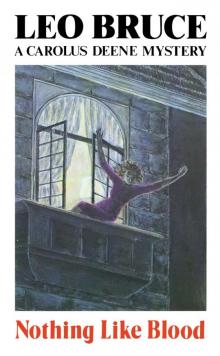 Nothing Like Blood
Nothing Like Blood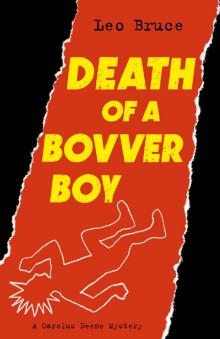 Death of a Bovver Boy
Death of a Bovver Boy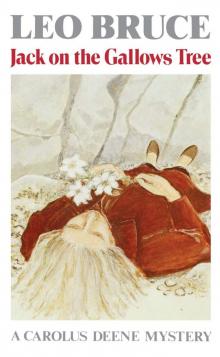 Jack on the Gallows Tree
Jack on the Gallows Tree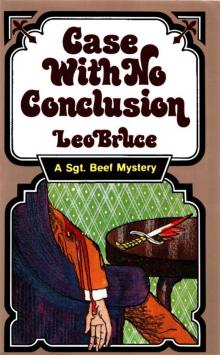 Case with No Conclusion
Case with No Conclusion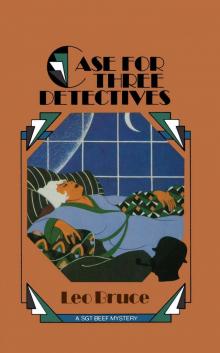 Case for Three Detectives
Case for Three Detectives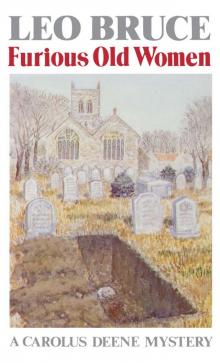 Furious Old Women
Furious Old Women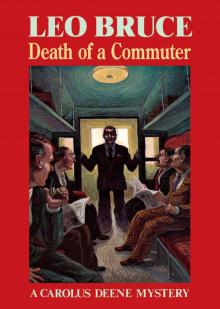 Death of a Commuter
Death of a Commuter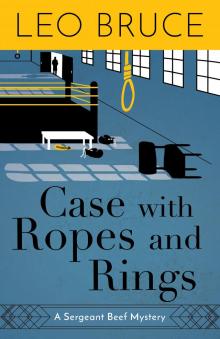 Case with Ropes and Rings
Case with Ropes and Rings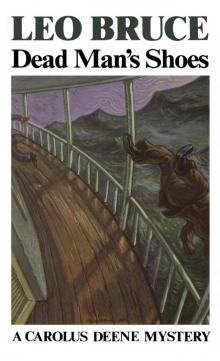 Dead Man’s Shoes
Dead Man’s Shoes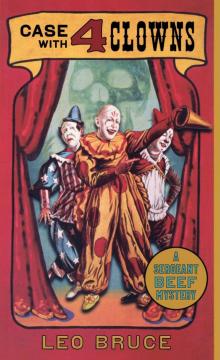 Case with 4 Clowns
Case with 4 Clowns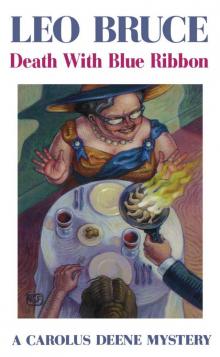 Death with Blue Ribbon
Death with Blue Ribbon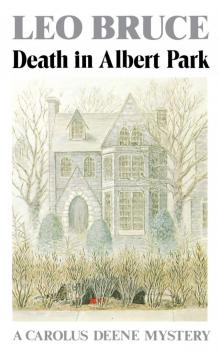 Death in Albert Park
Death in Albert Park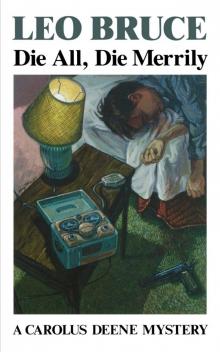 Die All, Die Merrily
Die All, Die Merrily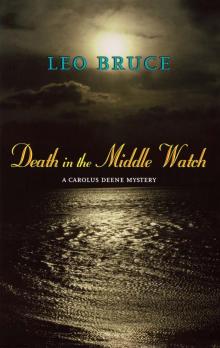 Death in the Middle Watch
Death in the Middle Watch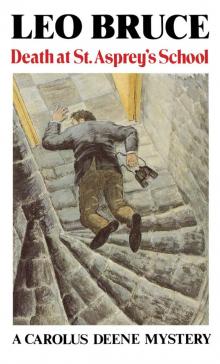 Death at St. Asprey’s School
Death at St. Asprey’s School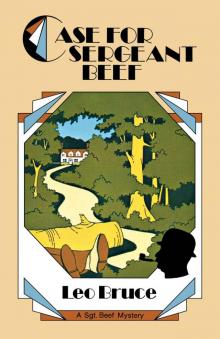 Case for Sergeant Beef
Case for Sergeant Beef